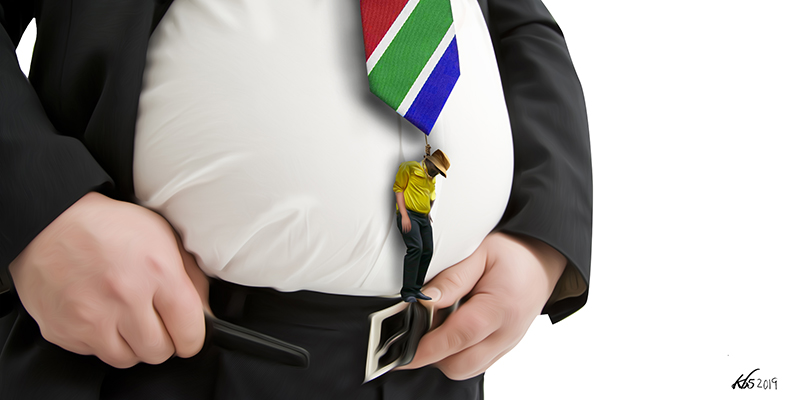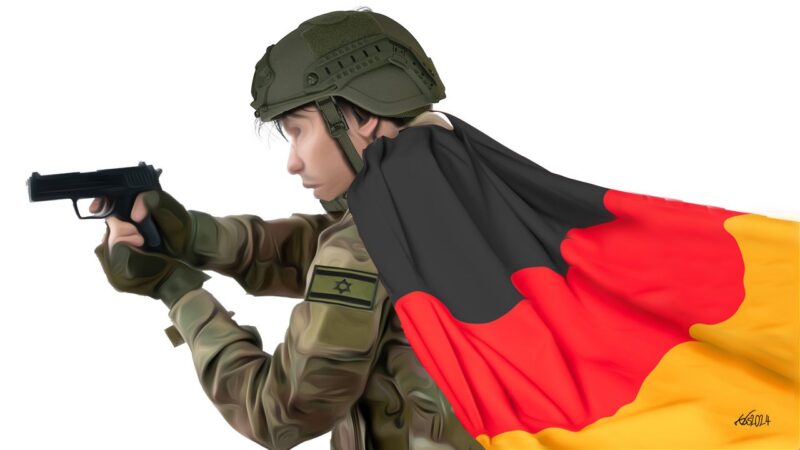The ongoing scandal surrounding South Africa’s former health minister, Zweli Mkhize, who was implicated by a special investigator in a COVID-19 corruption case, fired from office, yet thanked by President Cyril Ramaphosa for serving the nation well, is symptomatic of a terrible disease gripping South Africa. Literally, billions of rands are looted, not just by the predatory elite (a small collection of wannabe capitalists), but also by the “civilized” elites in Sandton (the financial heart of Johannesburg, where the country’s white-dominated private sector is headquartered). Their combined efforts are laying waste to the country’s economy.
COVID-19 has laid bare the depth of social, economic and political crises facing South Africa. No country or state can sustain a society where almost 50% of the workforce is unemployed. Nor is it possible to talk of a united single nation where just 10% of the super-rich own 90% of the wealth. And no society can develop where a woman is raped, on average, every 25 seconds.
Billions of rands is lost to looting, price gouging and profit shifting. This is money that the state should be investing in social renewal, creating decent work and reindustrializing the economy for a low carbon future. For example,
- Global Financial Integrity estimated South Africa lost around US$26 billion. through trade misinvoicing, transfer pricing, profit shifting and other forms of illicit financial outflows;
- According to Kenneth Brown (South Africa’s former chief procurement officer), in his 2016 report, 40% of the government’s budget for goods and services was being consumed by inflated prices from suppliers, and fraud.
- Davis Tax Commission conservatively estimated that South Africa loses at least R50 billion to corporate profit shifting annually;
- Former finance minister Pravin Gordhan estimated that “state capture” between 2014 -2017 cost R250 billion.
Corruption and cronyism dominate the discussion of South Africa’s current political situation. They are the symptoms of the crisis, at the core of the project to create a black capitalist class without redistributing wealth in the form of assets as capital.
The reality of state capture
Apredatory elite has increasingly taken control of the ANC and used it as a platform to influence state tender and procurement processes. This has been done from within the state at all levels, including state-owned enterprises. Hence the term “state capture.” This illustrates the linkages between capital and the state.
But instead of that being made clear, we get a story that it’s all about a bad faction of the ANC.
It is not something exclusive to Zuptas—members of the notoriously powerful and corrupt Gupta family with close connections to former state president Jacob Zuma. It stretches from CEOs of state-owned corporations, to director generals, chiefs, headmen, ward councillors, and even trade union officials. All desperate to accumulate, in order to escape their Apartheid-defined circumstances.
A key focus for all components of the aspirant black capitalist class is the state procurement budget, worth +/- R900 billion per year. It is to this procurement budget, and in particular the budgets of state-owned enterprises, that the organized network of predatory capital honed in on. And with Broederbond precision, they placed their people to facilitate access to the contracting process.
Civil war in the capitalist class
Even within the new black capitalist elite there are divisions. There are sections dependent on the state for accumulation, and others more dependent on transnational capital. Hence the political differences between a Jimmy Manyi, on the one hand, and a Sipho Pityana or Cyril Ramaphosa, on the other.
Ramaphosa’s clean-up campaign against corruption is convenient. It deals with his political opponents in the ANC. But it is riddled with contradictions. Some of his closest allies are deeply embroiled in corruption scandals. David Mabuza, the Deputy President, his close ally in the Eastern Cape Oscar Mabuyane and, of course, Gwede Mantashe, Pule Mabe and now Zweli Mkhize.
The roots of this crisis lie in the failure of the state and the ruling elites to renew a strategy for accumulating wealth that was capable of sustained economic growth and rates of profit for capital. Instead, the post-Apartheid government attempted to reproduce the accumulation model of the minerals-energy complex. At the same time it tried to engineer greater black ownership of the economy.
It has been a dismal failure, and a source of conflict inside the capitalist class. On the one hand there is an emerging black capitalist group hungry to secure ownership of the heights of the economy. On the other hand is big business, desperate to restore profitability in the face of global competition.
A dysfunctional state
This has coincided with a neoliberal hollowing out of the state. And this state is what the so-called “predatory elite” depend on. This has made the state even more dysfunctional as its institutions have been perverted to serve their interests.
Using the state for accumulation has consequences. Provision of water and other services is contracted out to private companies, whether they have the expertise to provide the service or not. Outsourcing and subcontracting become a major means of delivery of services and infrastructure development. This requires over-pricing and the cutting of corners to be profitable. And worse, neglect and even sabotage and destruction of infrastructure become a positive as they create opportunities for outsourcing, from which state officials can benefit. We are not short of examples: an estimated R57 billion needed to fix defective RDP houses and Rand Water’s accusations that water tanker contractors are sabotaging water pipes, to name but two.
So rivalries within the capitalist class, rather than between capital and labor, are most significant in shaping the current political situation. The consequences of this are not hard to see. Clover announced recently that it is closing down the country’s largest cheese factory in Lichtenburg, North West, blaming water and power outages. The company also struggled to use the road leading to the factory due to large potholes. Likewise, Astral Foods—South Africa’s largest poultry company, listed on the Johannesburg Stock Exchange with a market capitalization of R6.6 billion—was forced to take the government to court to try to get a reliable supply of electricity and water to its Standerton operation. As the CEO of Sibanye Stillwater, Neil Froneman, complains: “It’s one of the reasons why foreign companies don’t want to come here, because they can see they’ll have to do what the government is supposed to do but isn’t doing. They’ll end up tarnished with social issues that they haven’t caused.”
Opportunities for accumulation
This dysfunctionality is not a random outcome of looting. It is intentional. For big business it justifies liberalization and privatization; for the predatory elite it provides accumulation opportunities.
Eskom, the country’s electricity supplier, is a case in point. On the one hand, its crisis is justifying the creation of a private electricity sector, worth billions of rands, through the Renewable Energy Independent Power Producers Procurement Programme. And then, as the crisis deepens, the opportunities for private accumulation multiply. The R218 billion for Karpowership, a 20-year deal to supply 1,220 megawatts of electricity from gas-burning power plants stationed on ships moored offshore. And of course there is the plundering of Eskom’s massive procurement budget, whether for Kusile and Medupi or to supply coal.
The same process is unfolding at Transnet and Prasa where billions were looted. And it has given rise to the government’s plan to privatize part of the rail system and ports.
So where do we go from here?
As the fight between different sections of the ruling class intensifies, it is crucial to avoid false dichotomies: Ramaphosa good; Magashule bad. Neither faction of the ANC are friends of the workers and the poor. And as Ramaphosa gains the upper hand, leading to prosecutions against erstwhile comrades, this should not be seen as a renewal of the ANC.
Different factions of the ANC are differently implicated in looting and profiting through their political connections and proximity to the state. All factions agree on austerity and some version of neoliberalism as appropriate economic and social policy. The workers and popular movement should consider there to be a plague on their houses.
It is imperative not to repeat the mistakes of Cosatu and the SACP, which chose Zuma over Mbeki. The politics of “my enemy’s enemy is my friend” is mistaken. It leads to disasters, such as the 2007 Polokwane conference of the ANC.
The Alliance (the historical bloc consisting of the ruling ANC, the Communist Party and the main trade union federation, COSATU) is dead as a progressive block. In spite of the challenges of rebuilding the mass movement on principles of working class independence, it is the only way for the workers and popular movement to recapture relevance and move toward renewal. This will entail struggle on multiple fronts, not least corruption and state dysfunction.
The provision of decent social services, especially at local government level, is at the center of the struggle against corruption, cronyism and state capture. This struggle, and demands for in-sourcing and against privatization, will be important to unite workers in the labor movement with their sisters and brothers in working class communities.
The struggle against austerity, against wage cuts and retrenchments in the public sector, and the struggle against corruption are intimately linked. They provide the bridge for building the necessary worker/community alliance. To fight effectively against corruption, we have to join the struggle against austerity and neoliberalism.
–
This post is from a partnership between Africa Is a Country and The Elephant. We will be publishing a series of posts from their site once a week.








